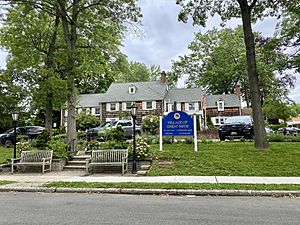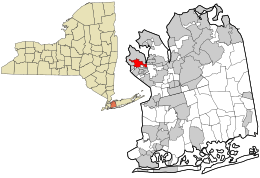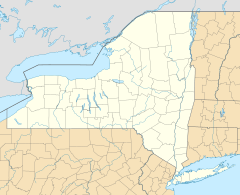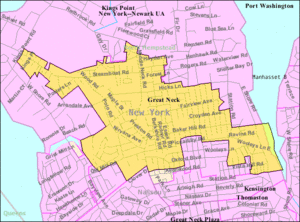Great Neck (village), New York facts for kids
Quick facts for kids
Great Neck, New York
|
||
|---|---|---|
| Incorporated Village of Great Neck | ||

Great Neck Village Hall on June 11, 2021.
|
||
|
||
| Nickname(s):
The Old Village
|
||

Location in Nassau County and the state of New York
|
||
| Country | ||
| State | ||
| County | Nassau County | |
| Town | North Hempstead | |
| First settled | 1644 | |
| Incorporated | 1922 | |
| Area | ||
| • Total | 1.35 sq mi (3.50 km2) | |
| • Land | 1.32 sq mi (3.43 km2) | |
| • Water | 0.03 sq mi (0.07 km2) 0% | |
| Elevation | 108 ft (33 m) | |
| Population
(2020)
|
||
| • Total | 11,145 | |
| • Density | 8,417.67/sq mi (3,249.19/km2) | |
| Time zone | UTC-5 (Eastern (EST)) | |
| • Summer (DST) | UTC-4 (EDT) | |
| ZIP codes |
11020–11027
|
|
| Area code(s) | 516 | |
| FIPS code | 36-30169 | |
| GNIS feature ID | 0951636 | |
Great Neck is a village in the town of North Hempstead in Nassau County, on the North Shore of Long Island, in New York, United States. The population was 9,989 at the 2010 census.
The term Great Neck is also commonly applied to the entire peninsula on the north shore and an area extending south to and including Lake Success. The larger Great Neck area comprises a residential community of some 40,000 people made up of nine villages as well as hamlets of North Hempstead, and to distinguish the Village of Great Neck from the other villages in the Greater Great Neck area, it is sometimes referred to as "the old village".
Contents
History
The Village of Great Neck incorporated as a village in 1922.
On August 9, 2022, Great Neck Village Hall was struck by lightning, which led to a fire breaking out and causing severe damage to parts of the building. Shortly afterwards, the Village announced its intentions to restore the structure, which was originally constructed in 1833.
Geography
The Village of Great Neck is located at 40°48′10″N 73°43′53″W / 40.802671°N 73.731255°W.
According to the United States Census Bureau, the village has a total area of 1.4 square miles (3.6 km2), of which 0.04 square miles (0.10 km2), or 1.46%, is water.
Demographics
| Historical population | |||
|---|---|---|---|
| Census | Pop. | %± | |
| 1880 | 1,112 | — | |
| 1930 | 4,010 | — | |
| 1940 | 6,167 | 53.8% | |
| 1950 | 7,759 | 25.8% | |
| 1960 | 10,171 | 31.1% | |
| 1970 | 10,798 | 6.2% | |
| 1980 | 9,168 | −15.1% | |
| 1990 | 8,745 | −4.6% | |
| 2000 | 9,538 | 9.1% | |
| 2010 | 9,989 | 4.7% | |
| 2020 | 11,145 | 11.6% | |
| U.S. Decennial Census | |||
As of the census of 2000, there were 9,538 people, 3,346 households, and 2,552 families residing in the village. The population density was 7,062.3 inhabitants per square mile (2,726.8/km2). There were 3,441 housing units at an average density of 2,547.9 units per square mile (983.7 units/km2). The racial makeup of the village was 85.33% White, 2.82% African American, 0.10% Native American, 4.94% Asian, 0.04% Pacific Islander, 3.28% from other races, and 3.48% from two or more races. Hispanic or Latino of any race were 9.17% of the population.
As of 2000 the Village of Great Neck was the second most Iranian place in the United States with 21.1% of its population reporting Iranian ancestry.
There were 3,346 households, out of which 36.6% had children under the age of 18 living with them, 63.9% were married couples living together, 8.8% had a female householder with no husband present, and 23.7% were non-families. 20.9% of all households were made up of individuals, and 12.2% had someone living alone who was 65 years of age or older. The average household size was 2.85 and the average family size was 3.30.
In the village, the population was spread out, with 26.4% under the age of 18, 6.0% from 18 to 24, 25.3% from 25 to 44, 24.7% from 45 to 64, and 17.5% who were 65 years of age or older. The median age was 40 years. For every 100 females, there were 94.2 males. For every 100 females age 18 and over, there were 90.0 males.
The median income for a household in the village was $76,645, and the median income for a family was $89,733. Males had a median income of $52,445 versus $37,476 for females. The per capita income for the village was $38,790. About 5.5% of families and 7.8% of the population were below the poverty line, including 9.5% of those under age 18 and 8.1% of those age 65 or over.
Education
School district
The Village of Great Neck is located entirely within the boundaries of (and is thus served by) the Great Neck Union Free School District. As such, all children who reside within the village and attend public schools go to Great Neck's schools.
Additionally, John L. Miller Great Neck North High School and the Village School are located within the village, and Great Neck North Middle School is located on the Incorporated Village of Great Neck's border, with the Incorporated Village of Kings Point.
Library district
The Village of Great Neck is located wholly within the boundaries of (and is thus served by) the Great Neck Library District.
Infrastructure
Transportation
Road
Major roadways in the Village of Great Neck include Arrandale Avenue, Baker Hill Road, Beach Road, East Shore Road, Fairview Avenue, Hicks Lane, Middle Neck Road, Old Mill Road, Polo Road, Station Road, and Steamboat Road.
Rail
No rail lines run through the Village of Great Neck. The nearest Long Island Rail Road station to the village is Great Neck on the Port Washington Branch.
Bus
The Village of Great Neck is served by the n57 and n58 bus routes, which are operated by Nassau Inter-County Express.
Utilities
Natural gas
National Grid USA provides natural gas to homes and businesses that are hooked up to natural gas lines in the Village of Great Neck.
Power
PSEG Long Island provides power to all homes and businesses within the Village of Great Neck.
Sewage
The Village of Great Neck is connected to (and is thus served by) the Great Neck Water Pollution Control District's sanitary sewer network.
Water
The Village of Great Neck is located within the boundaries of the Water Authority of Great Neck North, which provides the entirety of the village with water.
Sister city
The Village of Great Neck is twinned with the following cities:
- Tiberias, Israel (2002)
- Ein Qiniyye, Golan Heights (2022)





